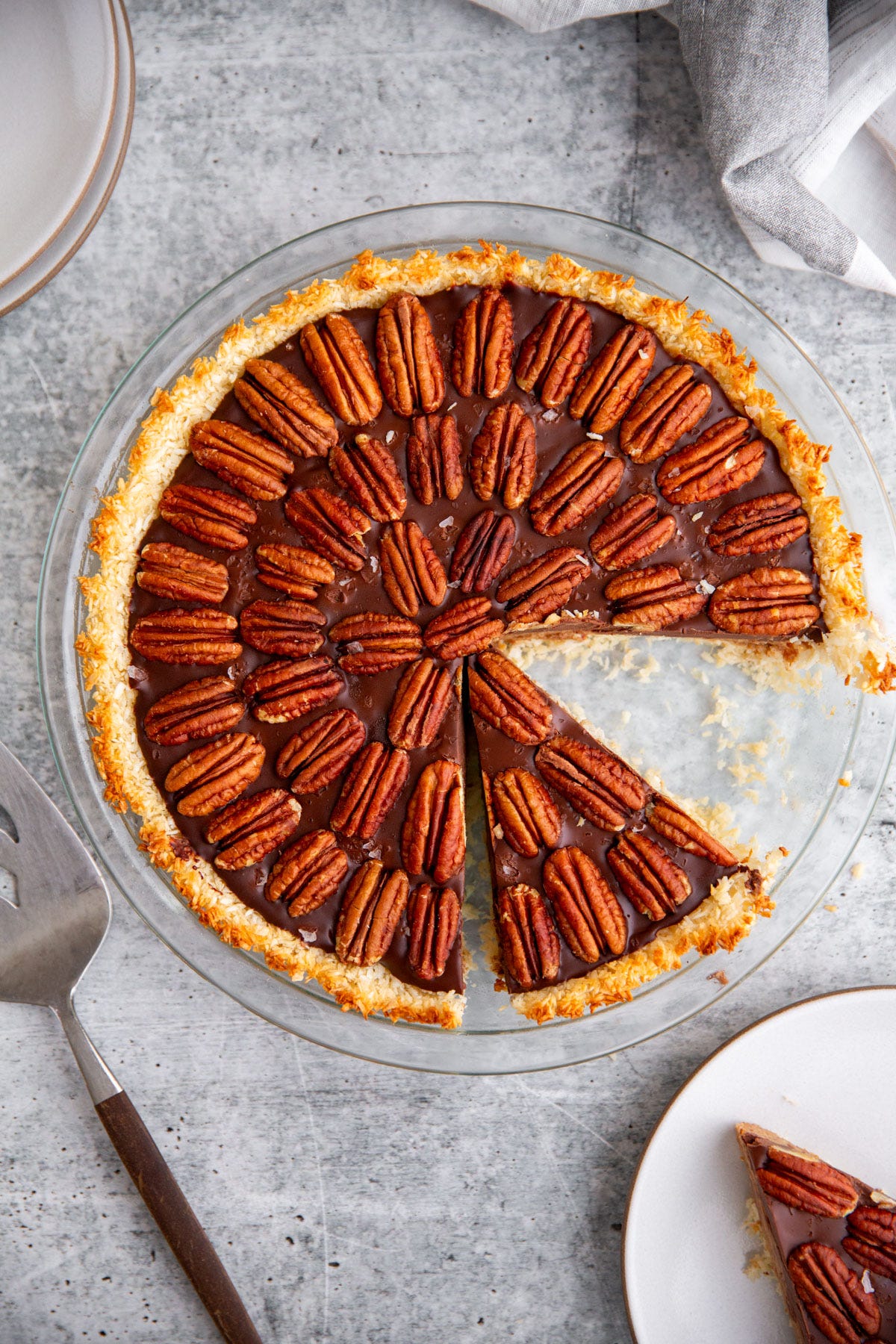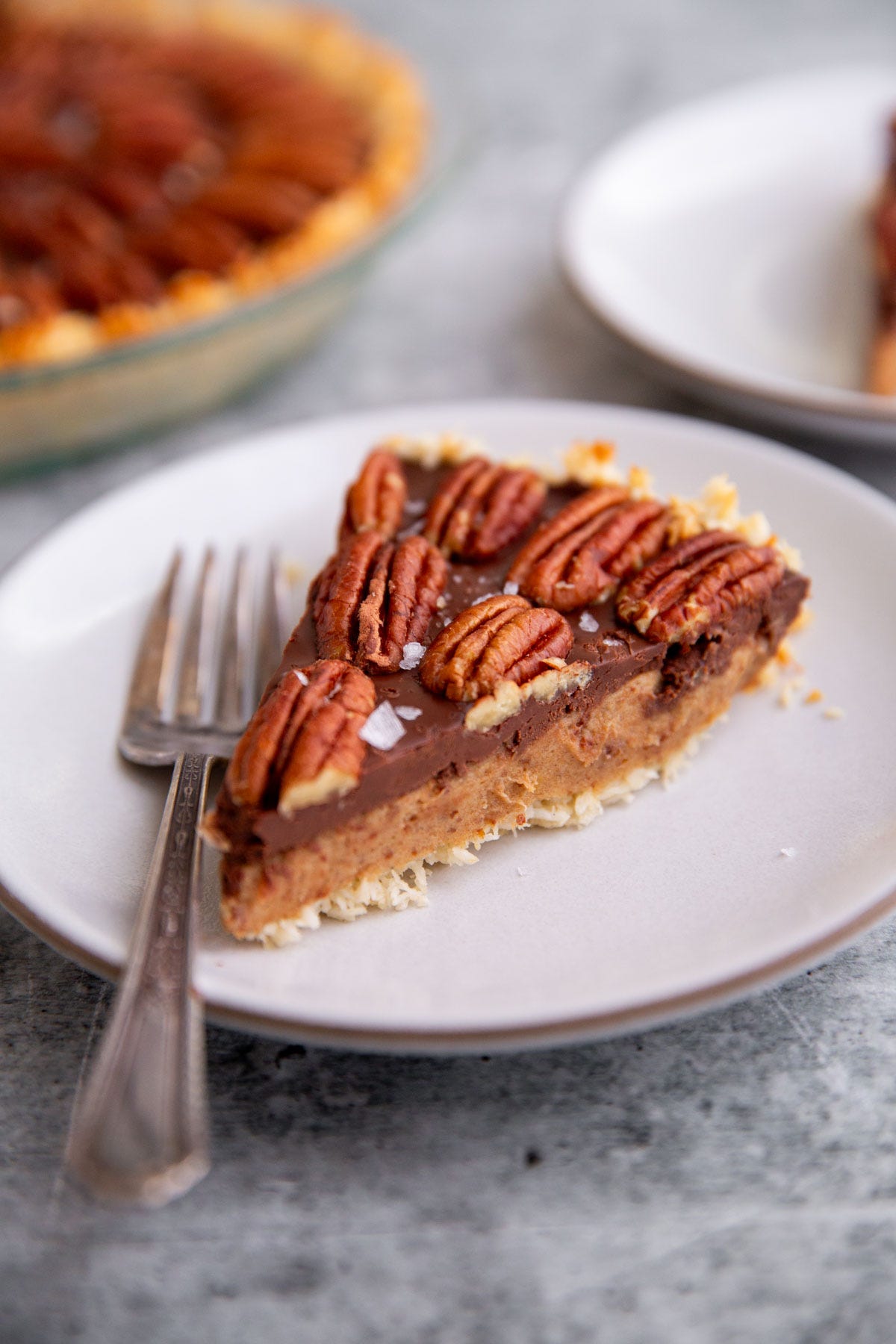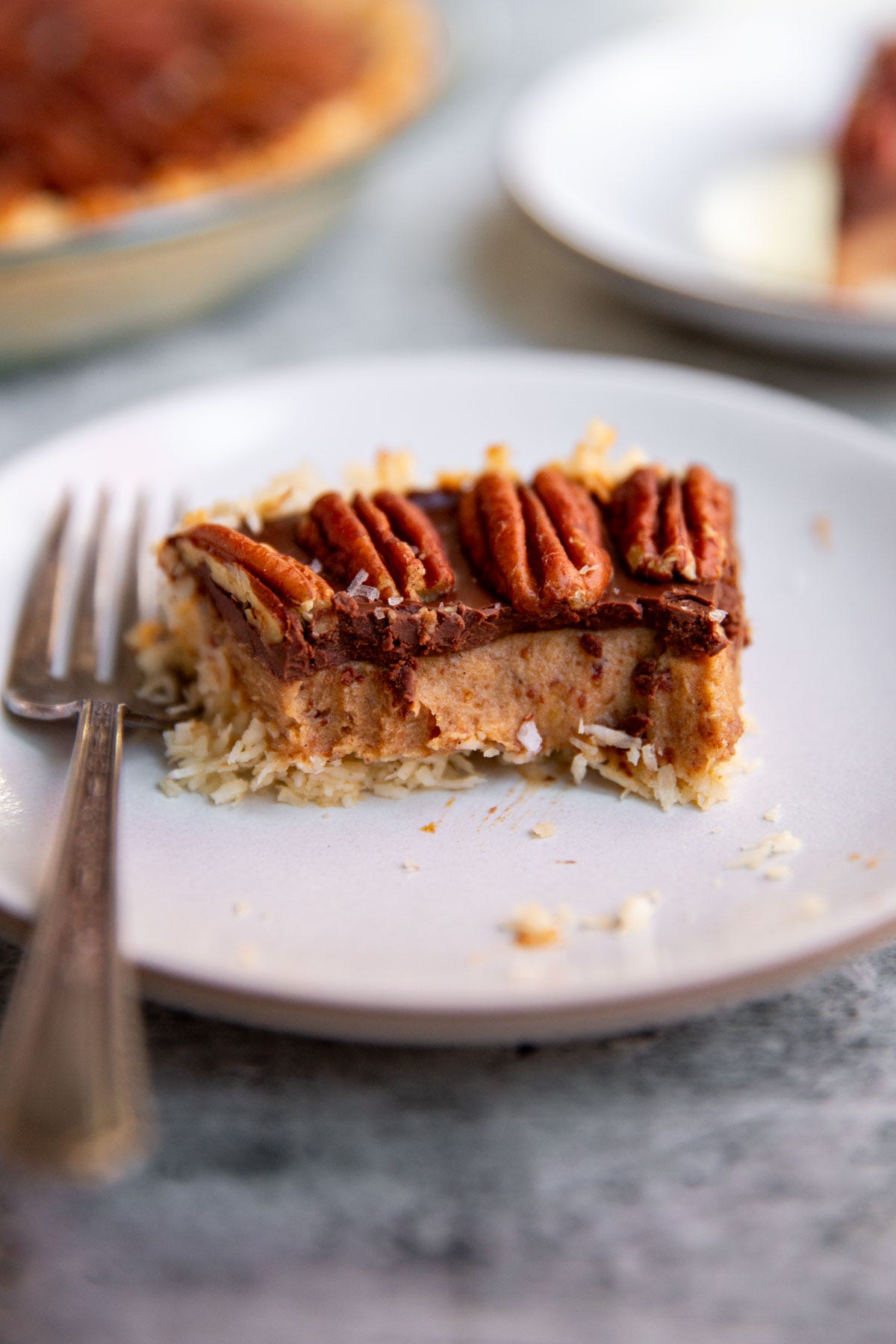Happy Friday, friends! Today I have a new pie recipe for you (!!). It’s a date caramel pie with a coconut crust and a dark chocolate and pecan topping. The creamy date caramel is a game changer—it’s silky and sumptuous but not cloying (it’s made with just Medjool dates, coconut milk and vanilla). The pie would be a fabulous (not-too-rich) finale to a holiday meal. Speaking of which, before we get into the recipe, let’s talk holidays, or rather, let’s take an uncomfortable look at how I’ve perpetuated perfectionism.
At their best, the holidays feel like a time of sanctity, connection, beauty, magic and rest. Truthfully, I’ve always loved the season (give me all the holiday foods, twinkling lights, decorations, and Christmas music!). However, the powers of capitalism and consumerism, coupled with deep patriarchal programming about what the holidays “should” be, are hard to avoid. Over the past couple of years I’ve had to renegotiate my relationship with the holidays, which hasn’t always been easy.
When I was growing up, it was the women who planned, cooked and basically did the holidays. At my grandma’s house, the women made dinner and then cleaned up afterwards (while the men went to watch football). Within my nuclear family, my mom, who had a full-time job when I was growing up, did everything, from the cooking, to the gift buying (this was before online shopping—she actually had to go to stores!), to the wrapping, holiday cards, etc. When I got married and had kids, I unconsciously took this all on (to add to the chaos, James and Juni also have birthdays in December). I felt—no, I believed—that the holidays needed to look and feel a certain way, with specific foods and dead-set traditions. I thought I needed to do all the things for the season—read: for me—to be successful.
Upholding holiday traditions falls heavily on the shoulders of women. This is deeply embedded in our patriarchal programming (I’ll be exploring the history and effects of this programming in next week’s podcast episode with
—it’s fascinating). As I discussed in this conversation with , cooking, shopping and decorating fall squarely in the domestic sphere and are often perceived as acts of love, instead of real, oftentimes overwhelming work. When these tasks are viewed as love, we lose agency. We don’t get to consent to the work, because it’s love! This gets complicated. I took on all of the holiday planning and executing because part of me truly loved (still loves) it, but also because I didn’t think I had a choice. I was conditioned into the role. I see now that I was performing the holidays, instead of fully experiencing them. I was perpetuating a system that was exhausting me, although at the time I couldn’t see it.To add the weight of it all, the holidays are a time of rampant perfectionism. We’re flooded with images, videos, commercials and social media posts showing perfectly mahogany turkeys, gorgeous tables, and happy families—and just to note, for decades this imagery focused on white nuclear families, completely excluding black, indigenous, marginalized, fat and queer people, as well as blended or single parent families. It’s impossible not to internalize some of these messages, comparing our own real, messy lives to the perfection that we see, even if internally we know it’s all an illusion.
I struggle with my own participation in this web of perfectionism. While I cut back mightily on Instagram when I started this newsletter, I still post pretty recipe reels and share stories (although I no longer track “likes” or “views” as I did as a food blogger). While I try to do this as a way to educate and inspire, and I made a commitment to only post when it feels fun , the reality is that this line gets easily blurred. Does it really feel fun right now to show you this roasted squash soup, or do I want to direct you to the recipe on the blog? Sometimes I can’t tell (and sometimes I damn well know the answer and post anyway). When you see the candlelit date-night-in stories of James and I, you never see the fights we have at the table (our hardest conversations always happen on date nights), or the whining kids during our Sunday night suppers. While I try to be authentic, is it fair to only show you the good stuff? Probably not. But it also doesn’t feel good to share the hard stuff either.
It’s hard not to perpetuate the systems that we also want to change. While social media exacerbates things, I think all of us (particularly women) have experienced the performative nature of the holidays at some point. We bake all the cookies because we feel like we have to, even though we’re tired and just want to rest. We say yes to the parties we’d rather not go to, but feel obligated to attend. We buy, and buy, and buy, even though we crave less, and less, and less. None of this is bad or wrong, but it slowly untethers us from our authentic desires.
A few years ago, after complaining to James about everything I had to do, I realized that I was caught within a cage of perfectionism and performance—a cage that was buttressed by capitalistic and patriarchal notions of what the holidays should be, but it was a cage that I had built myself. Only I could let myself out.
While this is ongoing work, I’ve slowly started to reclaim the holidays for myself. I stick with the same Thanksgiving menu (which can mostly be made ahead—get it here) and delegate tasks. We cut back drastically on the holiday gifts for the kids. I decided we’d only bake if it felt fun (meaning some years we bake batches and batches of Christmas cookies and some years we make only these, because I love them too much not to make them). I also allowed myself to say no (last year we didn’t go to a single party). I check in often to see what I really want, and I try to pay better attention to when I’m slipping back into the “shoulds” of perfectionism. I try to put down my phone more often (I’m working on it).
When we reclaim the holidays for ourselves, we can begin to weave a new picture of what the season can be. Only in getting curious about our own authentic needs and desires can we begin to step out of the deeply entrenched patriarchal and consumeristic scaffolding that currently upholds this season. Truthfully, that scaffolding (if we even recognize it’s there) often feels safer than exploring our own path. But it’s a false sense of comfort. It’s an external seeking rather than an internal knowing, and it disconnects us to our own inherent worthiness.
This isn’t always easy work, especially because the expectations of others often weigh heavily on our shoulders. It takes courage to place our own needs and desires at the same standing of those we love. It necessitates heartfelt, honest and sometimes difficult conversations. But we can also start small. Three years ago I decided that I would no longer make my yearly (time-consuming) peppermint butter-cruch candy, which sounds silly, but it opened the door to my own agency (and yes, I had to explain my decision to the kids, who were disappointed). We can choose to rest more. We can simplify our menus (or go all out if that brings us joy). We can ask for help. We can put our phones down. We can share a meal for the pure joy of connection. We can sit quietly, together, in celebration of Life.
One last important note
While it feels strange to be talking about any of this while there is so much turmoil and sadness in the world at the moment, I also feel that now, more than ever, we need to come together in authentic connection. I believe that celebrating love and beauty can be a critical way of resisting (although not denying) the fear and strife that are growing around us. When we center ourselves in grace and gratitude—authentically, not performatively—we can better respond to the real problems we face, with wisdom and perspective.
Related essays, podcasts and links:
Embodiment as Resistance to Patriarchy (podcast)
Unpacking our Personal Perfects (podcast) by
and
Date Caramel & Chocolate Pecan Pie
For me, there are few better ways to connect with others than by sharing a meal or, even better a slice of pie, eaten slowly and intentionally with steaming mugs of hot tea, candles burning to stubs, and conversations swirling.
As you know, pie is my very favorite thing to make and eat, but there is one kind of pie I don’t like: pecan pie (yet, ironically these mini maple pecan tarts are my favorite holiday cookie). I set out to create a pecan pie-ish dessert that I loved, and hence this date caramel baby was born. While it’s nothing like a traditional pecan pie, it shares some of its richness (just without the cloying aftereffects).
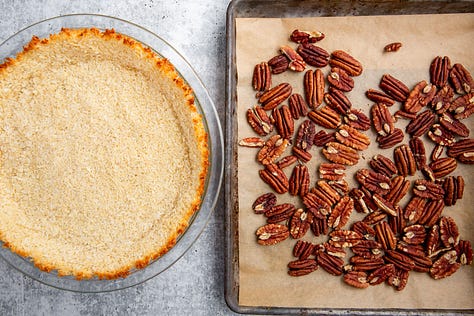
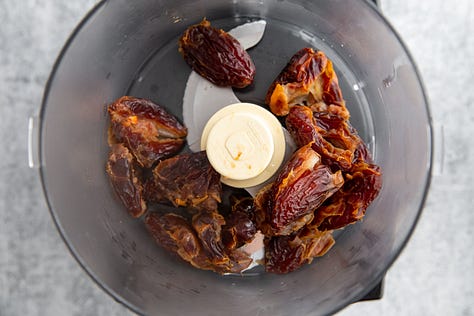
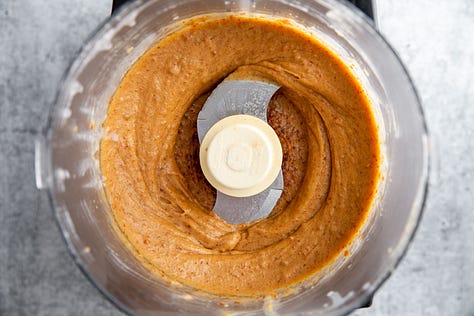
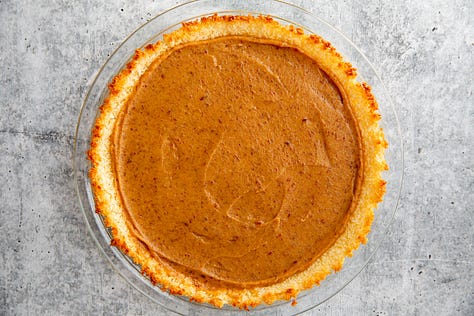
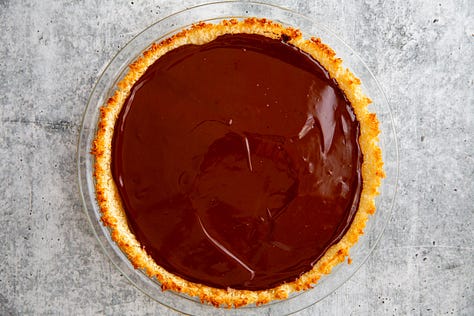
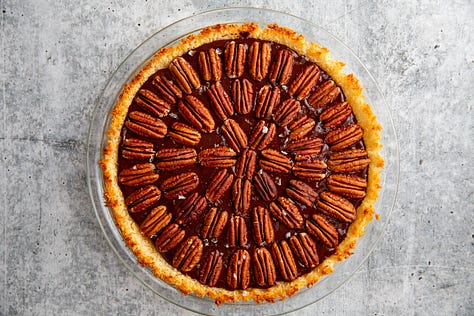
I started with a crumbly coconut crust, which is a fun contrast to the rich filling, but you could use this regular pie crust instead, or a graham cracker crust (like the one from this chocolate pudding pie). The date caramel is super easy to make and pairs wonderfully with a thick topping of dark chocolate ganache, toasted pecans and flaky sea salt. The salt is key, as it brings all of the other flavors into sharp contrast. It’s a sumptuous dessert, but not too heavy or sweet, and it’s naturally gluten-free and dairy free (it can also be made vegan).
Please let me know if you give the pie a try! I’ve also linked to more Thanksgiving desserts below, and if you’re looking to master traditional pie dough, my Mastering Gluten Free Pie Making Class is on a flash sale of 30% off this week with the code THANKSGIVING.
Keep reading with a 7-day free trial
Subscribe to Mind, Body, Spirit, FOOD to keep reading this post and get 7 days of free access to the full post archives.





